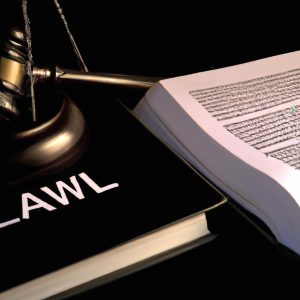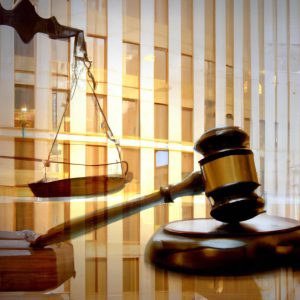Navigating the complexities of probate can be a daunting task, especially when it comes to determining whether or not a property is involved in the process. As experienced legal professionals at Morgan Legal Group in New York City, we understand the importance of clarity in matters of estate planning and probate. In this article, we will guide you through the necessary steps to find out if a property is in probate, providing you with valuable insights and knowledge to help you make informed decisions.
Determining Legal Ownership of Property
To determine the legal ownership of a property, one must first establish if the property is in probate. Probate is the legal process of administering the estate of a deceased person, resolving any claims and distributing the deceased person’s property according to their Will or according to the law if there is no Will. There are several steps to take in order to find out if a property is in probate:
- Check the public records: One can start by checking the public records at the County Clerk’s office where the property is located. Look for any probate filings or records related to the property.
- Contact the probate court: If there is no information available in the public records, contact the probate court in the county where the property is located. They may be able to provide information on whether the property is in probate and who the legal owner is.
If you are unsure about the legal ownership of a property or need assistance with probate matters, it is recommended to seek the guidance of a qualified estate planning attorney. At Morgan Legal Group, our team of experienced lawyers in New York City can help you navigate the complex legal processes involved in determining the legal ownership of property, probate, and other estate planning matters. Feel free to contact us for a consultation and personalized legal advice.
| Name | John Smith |
| Property Address | 123 Main Street, New York, NY |
| Probate Status | In process |
Investigating Public Records for Probate Information
In order to determine if a property is in probate, it is crucial to investigate public records for probate information. One of the key resources to consult is the probate court in the county where the deceased individual resided. This court handles the legal process of administering the estate, including ensuring that the deceased’s debts are paid and their assets are distributed according to their will or state law.
Another valuable source of probate information is the county clerk’s office, where probate records such as wills, estate inventories, and distribution of assets are typically filed. Additionally, searching property records can provide insights into whether a property is part of the probate process. By thoroughly examining these public records, you can gain a better understanding of the status of a property and its involvement in probate proceedings.
Consulting with the County Clerk’s Office for Confirmation
When dealing with matters related to a property that may be in probate, it is crucial to consult with the County Clerk’s Office for confirmation. The County Clerk’s Office is responsible for maintaining public records, including those related to estates and probate proceedings. By reaching out to the County Clerk’s Office, you can verify if a property is indeed in probate and obtain the necessary information to proceed with any legal matters.
During your consultation with the County Clerk’s Office, be prepared to provide specific details about the property in question, such as the address and the names of the parties involved. Additionally, consider asking about the status of the probate proceedings and any relevant deadlines. By gathering this information, you can better understand the situation and take appropriate action. Remember, consulting with the County Clerk’s Office is an essential step in navigating the complex legal process of probate.
Hiring an Experienced Probate Attorney for Guidance and Assistance
Finding out if a property is in probate can be a complex process, but with the help of an experienced probate attorney, you can navigate the legal intricacies with ease. One way to determine if a property is in probate is by searching public records for the deceased person’s estate. This can be done by visiting the county clerk’s office or searching online databases. A probate attorney can assist with this search and provide guidance on interpreting the information found.
Another method to identify if a property is in probate is by contacting the executor of the estate. The executor is responsible for managing the deceased person’s assets, including any property in the estate. By reaching out to the executor, you can gather valuable information about the probate process and the status of the property. An experienced probate attorney can help facilitate communication with the executor and ensure that your rights and interests are protected throughout the probate proceedings. Hiring a knowledgeable probate attorney is essential for gaining the guidance and assistance needed to navigate the complexities of the probate process.
Q&A
Q: What is probate?
A: Probate is the legal process through which a deceased person’s estate is settled, including distributing assets and paying off debts.
Q: How can I find out if a property is in probate?
A: One way to determine if a property is in probate is by checking the public records at the courthouse where the property is located. You can search for the deceased person’s name or the property address to see if any probate proceedings have been initiated.
Q: Are there any online resources I can use to search for probate information?
A: Yes, there are several online databases and resources that can help you search for probate information, such as probate court websites, online estate planning tools, and probate research services.
Q: What information do I need to search for probate records?
A: To search for probate records, you will typically need the deceased person’s full name, date of death, and the county where the probate proceedings are taking place. You may also need the property address or any other identifying information.
Q: Why is it important to determine if a property is in probate?
A: Knowing if a property is in probate can help you determine the legal status of the property and who has the authority to sell or transfer ownership. It can also impact the timeline and process for purchasing or inheriting the property.
Insights and Conclusions
In conclusion, navigating the complexities of probate when it comes to real estate can be a daunting task. By following the steps outlined in this article, you can arm yourself with the knowledge needed to determine whether a property is in probate. Remember to consult with legal professionals for guidance and assistance, as each situation may vary. With patience and diligence, you can confidently approach the probate process and make informed decisions regarding real estate transactions. Good luck in your property search!
Are you considering buying a property but not sure if it’s in probate? Or are you an heir trying to figure out the status of a potential inheritance? Either way, it’s important to know if a property is in probate as it can significantly affect your decision-making process and timeline.
In this article, we will discuss everything you need to know about probate and how to find out if a property is in probate. We’ll also provide practical tips and guidance to help you navigate through the process smoothly. So let’s get started!
Understanding Probate
Probate is a legal process that settles the estate (assets and property) of a deceased person. This process is supervised by the court, and its main purpose is to transfer the ownership of the assets to the rightful beneficiaries. It involves validating the deceased’s will, paying off their debts and taxes, and distributing the remaining assets according to the will or state laws if there is no will.
The probate process usually takes six to nine months to complete, but it can be longer in some cases, especially if there are complications or disputes. During this time, the property in question may not be available for sale, as it is technically still owned by the deceased until the probate is completed.
So how do you find out if a property is in probate?
1. Check Public Records
The first step is to search public records, as probate is a court-supervised process, and all records related to it are public information. You can contact the probate court in the county where the deceased lived or owned the property and request the information. Alternatively, you can also search online on the county’s official website for probate cases.
2. Look for Probate Notices in Local Newspapers
In some cases, the executor of the will may publish a notice in the local newspaper, informing creditors and potential heirs of the probate process. The notice usually includes the deceased’s name, date of death, and the property’s location. This can help you identify if the property is in probate and who to contact for further information.
3. Hire a Title Search Company
If you’re looking at a specific property, you can also hire a title search company to do a search for you. They have access to databases and records that can provide detailed information about the property, including ownership, liens, and any probate proceedings.
Benefits and Practical Tips
Now that you know how to find out if a property is in probate, let’s look at the practical tips and benefits of knowing this information.
1. Saves Time and Effort
Knowing if a property is in probate can save you time and effort in your property search. If you’re a buyer, you can avoid wasting time on a property that is not available for sale. If you’re an heir, you can manage your expectations and plan ahead as the probate process can take some time.
2. Avoid Legal Complications
Buying or selling a property in probate can be complicated, and without proper knowledge, you may end up facing legal complications. As a buyer, you may be required to seek court approval before purchasing the property, and as an heir, you may need to navigate through complicated tax and inheritance laws. Knowing if the property is in probate can help you prepare for these potential legal hurdles.
3. Negotiate a Better Deal
If you’re interested in purchasing a property in probate, you may have an advantage during negotiations. As the probate process can be lengthy, the executor or heirs may be willing to sell the property at a lower price to speed up the process.
Case Study – The Importance of Knowing if a Property is in Probate
Let’s look at a real-life scenario to understand the importance of knowing if a property is in probate.
John is interested in purchasing a property he found online. He contacts the real estate agent and schedules a viewing. He likes the property and plans to make an offer. However, the agent informs him that the property is in probate, and the executor has not yet been appointed.
John decides to wait until the probate is completed before proceeding with his purchase. A few weeks later, he receives news that the property is now available for sale, and he makes an offer. As the property had been on the market for some time, he was able to negotiate a lower price and save some money.
First-hand Experience – Tips for Buyers
For buyers interested in purchasing a property in probate, here are some additional tips to keep in mind.
1. Be Patient
As mentioned earlier, the probate process can take some time, so be patient and keep checking for updates on the property’s status.
2. Get a Real Estate Attorney
It’s always a good idea to seek the advice of a real estate attorney before making any major purchases. They can help you understand the legal implications and ensure a smoother transaction.
3. Be Flexible
Probate sales can be unpredictable, so be prepared to be flexible with your timeline and expectations.
In Conclusion
Knowing if a property is in probate is essential for both buyers and heirs. It can help you make informed decisions, save time and effort, avoid legal complications, and even negotiate a better deal. By following the tips and guidance provided in this article, you can easily find out if a property is in probate and navigate through the process smoothly. Remember to always seek professional advice when dealing with probate properties to avoid any potential legal issues.






